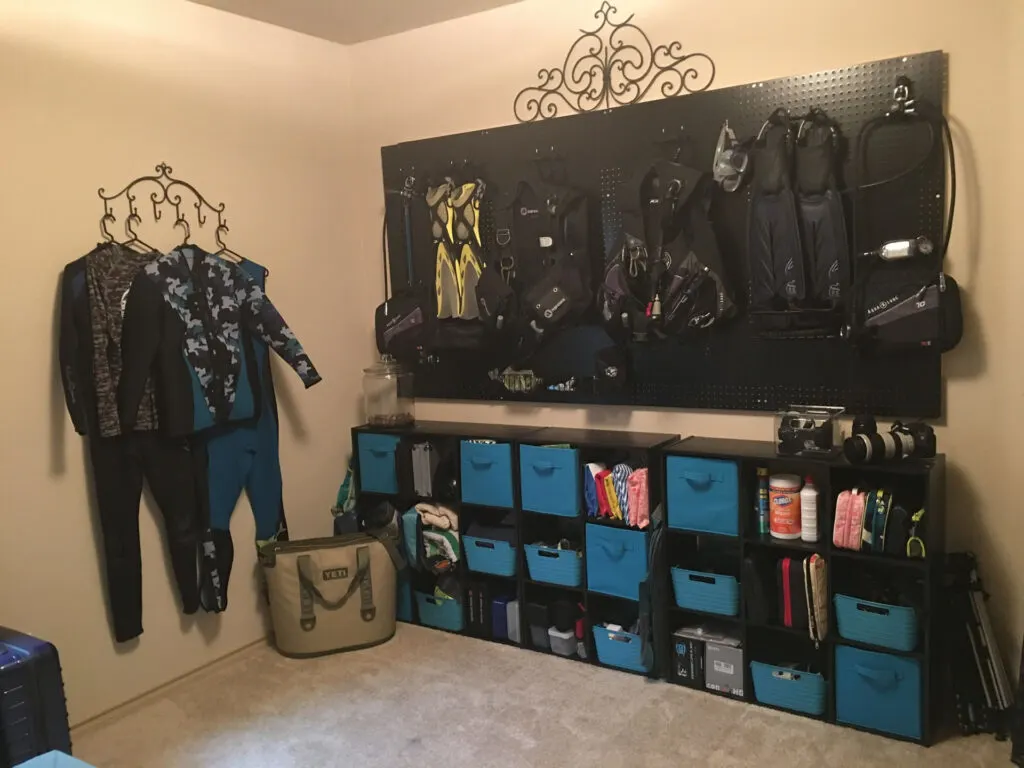
Image Source: Google
Scuba diving is an exhilarating activity that allows you to explore the wonders of the underwater world. To make the most of your dive adventures, it's essential to properly store your scuba gear. Proper storage not only prolongs the lifespan of your equipment but also ensures that it stays in good condition for your next dive. Here are some essential scuba gear storage tips to help you maximize your dive adventures.
1. Rinse and Dry Your Gear Properly
After each dive, it's crucial to rinse your gear with fresh water to remove salt, sand, and other debris that can cause damage over time. Here's how you can properly rinse and dry your scuba gear:
Rinsing Your Gear:
- Use a hose or a bucket of fresh water to rinse off saltwater and debris.
- Pay special attention to areas like zippers, buckles, and valves where salt and sand can accumulate.
- For regulators and other sensitive equipment, use a damp cloth to wipe down the surfaces.
Drying Your Gear:
- Avoid direct sunlight, as it can cause damage to neoprene and other materials.
- Hang your gear in a well-ventilated area to air dry completely before storing it.
- Ensure that wet gear is stored away from direct heat sources to prevent mold and mildew growth.
2. Store Your Gear in a Cool, Dry Place
Proper storage is key to maintaining the integrity of your scuba gear. Here are some tips for storing your gear in a cool, dry place:
Choosing a Storage Area:
- Select a storage area that is cool, dry, and away from direct sunlight.
- Avoid storing your gear in a damp basement or hot attic, as moisture and heat can damage your equipment.
- Consider using a dedicated gear bag or storage container to keep everything organized and protected.
Hang Your Wetsuit and BCD:
- Hang your wetsuit on a thick hanger to maintain its shape and allow it to air out.
- Inflate your BCD slightly before hanging it to prevent creases and ensure that it dries properly.
- Store your BCD in a partially inflated state to maintain the integrity of the bladder.
3. Inspect and Maintain Your Gear Regularly
Regular inspection and maintenance are essential to ensuring that your scuba gear stays in optimal condition. Here's how you can inspect and maintain your gear regularly:
Regulator Maintenance:
- Rinse and soak your regulator in fresh water after each dive to prevent corrosion.
- Inspect the hoses, O-rings, and other components for signs of wear and tear.
- Get your regulator serviced by a professional at least once a year to ensure it functions properly.
BCD Care:
- Check the inflator mechanisms and valves for any leaks or malfunctions.
- Inspect the straps, buckles, and pockets for signs of damage and replace any worn-out parts.
- Test the inflator and deflator buttons before each dive to ensure they are working correctly.
4. Keep Your Gear Organized
Staying organized is key to maximizing your dive adventures. Here are some tips for keeping your gear organized:
Label Your Gear:
- Use waterproof labels or tags to identify your gear and prevent mix-ups.
- Label your dive bag or gear container with your name and contact information in case it gets lost.
- Create a checklist to ensure you have all the necessary gear before each dive.
Use Gear Bags and Pockets:
- Invest in gear bags with multiple compartments to keep your equipment organized.
- Utilize pockets and pouches to store smaller items like dive lights, dive computers, and dive logs.
- Keep essentials like your mask, fins, and snorkel in a separate bag for easy access.
By following these essential scuba gear storage tips, you can ensure that your equipment stays in top condition and ready for your next dive adventure. Proper storage and maintenance not only prolong the lifespan of your gear but also enhance your overall diving experience. So remember to rinse, dry, inspect, and organize your scuba gear to maximize your dive adventures!